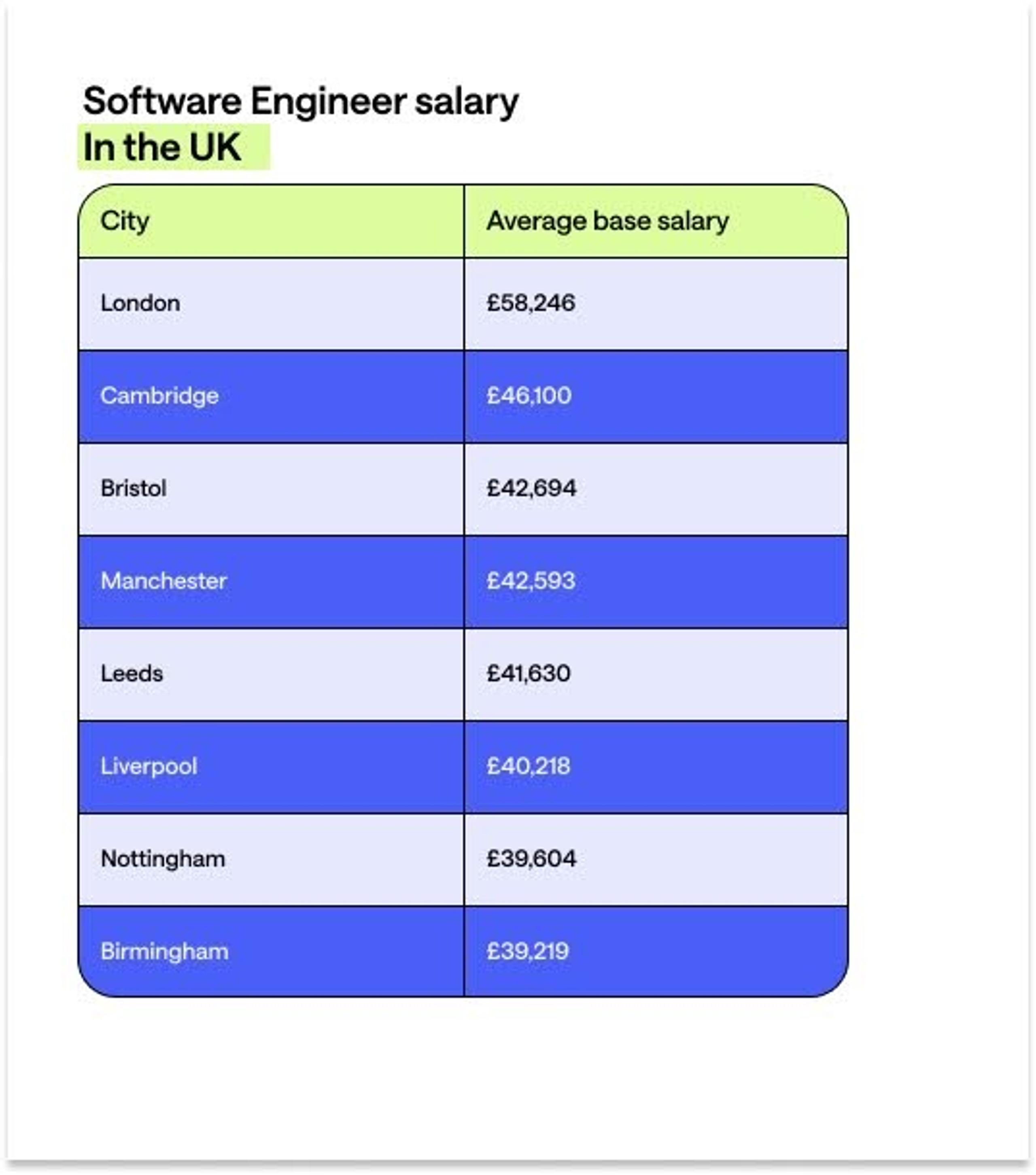The average Software Engineer salary in the UK is higher than most other professions. Recent figures suggest most make anywhere between roughly £40,000-£150,000. But how much money you actually make as a Software Engineer depends on factors like your location, years of experience, and industry.
Whether you’re merely considering an engineering career or looking to understand how your current salary stacks up, this blog will guide you through everything you need to know — from basic Software Engineer salary expectations, to job outlook, skills and training.
Software Engineer Salary in the UK
According to Glassdoor, the average Software Engineer salary in the UK is around £46,000. The figure is above the median gross pay for all full-time employees of £37,430(opens new window) (ONS).
Many factors influence a Software Engineer’s salary, including experience level, skills, location and role. And the data reported varies by sources. But here’s what you may earn as a Software Engineer in the UK:
- Lower-end salary: £42,000
- Average base salary: £52,500
- 90th percentile salary: £160,000
Data sources: Indeed, Talent and Levels.fyi.
Highest-Paying Cities for Software Engineers in the UK
Where you live in the UK impacts how much you earn as a Software Engineer. In 2025, London companies pay Software Engineers around £58,000 on average before bonuses and other incentives, while Liverpool companies pay around £40,000, according to Glassdoor salary data. The eight highest-paying cities for Software Engineers in the UK are:
- London
- Cambridge
- Bristol
- Manchester
- Leeds
- Liverpool
- Nottingham
- Birmingham
Here’s that data broken down by city, updated for 2025.

Table showing the average Software Engineer salary in top UK cities as of 2025.
Software Engineer Salary by Job Title
Software engineering is a broad industry with many well-paying roles to choose from. Here are some common software engineering job titles and what you can earn in each. (Unless otherwise noted, all salary data is from Talent.)
Front-End Developer
Front-End Developers focus on building the front-end elements of websites or applications that people interact with and see. They learn programming languages like HTML, CSS and JavaScript.
Front End Developers also fix code errors and debug applications. As a Front-End Developer, you must understand user design and experience principles.
Front End Developer salaries in the UK, according to Glassdoor salary data:
1. Low-level salary: £32,000
2. Average base salary: £41,000
3. High-paying salary: £53,000+
Web Developer
Web Developers are similar to Front-End Developers, but they focus solely on websites. As a Web Developer, you’ll either build websites from scratch or manage existing websites. You may also be responsible for improving website loading speed, technical search engine optimisation (SEO), and other performance indicators.
Web Developer salaries in the UK:
1. Low-level salary: £26,000
2. Median salary: £33,000
3. Top-paying salary: £43,000+
Back-End Developer
Back-End Developers work on the back-end; i.e., all the elements that make an application run but users don’t see. As a Back-End Developer, you’ll likely use programming languages like Python, PHP and Ruby. Back-End Developers also work closely with Front-End and Web Developers to unite server-side (back-end) and front-end efforts.
Back-End Developer salaries in the UK:
1. Low-level salary: £53,000
2. Median base salary: £64,000
3. Top-paying salary: £78,000+
Full-Stack Developer
Full-Stack Developers work on front and back-end development. They tend to be generalists but have a few years of experience in both areas. Because their skills are so versatile, there’s a high demand for Full-Stack Developers.
Full-Stack Developer salaries in the UK:
1. Low-level salary: £41,000
2. Median base salary: £53,000
3. Top-paying salary: £70,000+
Cyber Security Engineer
Cyber Security Engineers focus on protecting a company’s networks, systems and data. They identify any potential security threats and create solutions to secure them. As a Cyber Security Engineer, you’ll be responsible for data security. Example tasks include installing firewalls, testing systems for vulnerabilities and analysing risk.
Cyber Security Engineer salaries in the UK:
1. Low-level salary: £34,000
2. Median base salary: £45,000
3. Top-paying salary: £61,000+
Data Engineer
Data Engineers combine data analytics with software engineering. As a Data Engineer, you’re responsible for designing and creating data systems. More specifically, your work will help companies collect, store and understand large amounts of raw data. You’ll also work to make data more accessible to other team members like Data Scientists and Business Analysts who interpret the data you provide.
Data Engineer salaries in the UK:
1. Low-level salary: £38,000
2. Median base salary: £48,000
3. Top-paying salary: £61,000
What Does a Software Engineer Do?
As a Software Engineer, you can develop software, websites or other applications. Software engineering is a broad discipline and can lead to many different career paths. Here are some of the basic skills and responsibilities to help you understand what you’ll do as a Software Engineer.
Software Engineer responsibilities:
Analyse complex information
Software Engineers dissect intricate data and systems to understand their functionalities and limitations. This level of analysis is important for identifying potential issues, optimising performance, and developing new features.
Translate client and user needs into practical business solutions
Bridging the gap between user expectations and technological capabilities, Software Engineers convert client requirements and user feedback into actionable development plans.
Write, test and rewrite code to improve existing programmes
Continuous improvement is a cornerstone of software development. Engineers rigorously write and test code to enhance its functionality, efficiency, and security. This process can involve tasks like debugging, refactoring, and sometimes overhauling large sections of code.
Find and fix bugs
Identifying and resolving software bugs is another Software Engineer responsibility. Engineers use a variety of debugging tools and techniques to diagnose problems, ensuring applications run smoothly and efficiently.
Collaborate with other programmers, Technical Writers, clients and colleagues across departments
Engineers work alongside programmers, Technical Writers, and other stakeholders, sharing knowledge and insights to guide the software’s development, documentation, and deployment.
Source new technologies that solve business problems
Software Engineers research and integrate emerging technologies that can offer competitive advantages. This can involve evaluating new tools, languages, and frameworks, that can improve product offerings and drive innovation.
Keep up with training needs and best practices
The tech landscape is ever-evolving. So continuous learning is essential for Software Engineers. They must stay informed of the latest industry trends, best practices, and technological advancements.
To become a Software Engineer, you should be interested in developing these skills in your career:
1. Technical skills: You’ve built a software application in JavaScript, for example.
2. Coding skills: You know different programming languages like JavaScript, SQL and CSS.
3. Commercial mindset: You understand the Software Development Life Cycle and how to meet business needs.
4. Communication: You communicate technical concepts to non-technical people.
5. Problem-solving: You ‘troubleshoot’ tech problems and fix bugs.
6. Analysis: You analyse technical information while understanding user and client requirements.
7. Commitment to training: You want to become a master in your field by continuously learning and improving.
Aside from demonstrating relevant skills (or a commitment to learning them), employers may require specific qualifications:
- At least a grade of 4/C GCSE (or equivalent) in Maths and English
- A Levels in relevant subjects like Computing
- A Software Engineering Level 4 apprenticeship standard or the willingness to work towards one
Are Software Engineers in Demand?
It’s unknown exactly how many Software Engineers currently work in the UK, but the total is likely comparable to other leaders in Europe, such as Germany. The problem for employers? The demand for Software Engineers doesn’t equal the supply. Add to that the fact that nearly 20% of engineers in the UK are likely to retire by 2026(opens new window), and it’s clear that the role is in demand.
A quick search for “Software Engineer” jobs on LinkedIn also highlights the demand, with more 18,000 UK job openings on the platform as of February 2025.
Typical Software Engineer career progression
Freshly minted programming professionals often start their careers as Junior Software Developers. As they gain experience and specialisations, many progress into Data Engineering or other domains or become mid and senior-level SWEs.
To make the leap to mid-senior level, Software Engineers often require training and skill development in areas ranging from cyber security to AI. They also need to understand how to innovate, increase productivity, and connect the impact of specific projects to larger organizational goals.
If you’re looking to take the next step in your career as a Software Engineer, Multiverse’s Advanced Software Engineering programme could be right for you. Our programme focuses on applied impact and measured learnings, helping teams unlock enhanced productivity. The best part? You upskill on the job, meaning you don’t have to pause your career while learning — and employers cover the costs of the programme once they partner with Multiverse.
If you want to take the next step in your engineering career, create a profile with us today(opens new window) in just minutes. Our team can then double-check your eligibility and discuss apprenticeship options.







